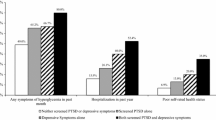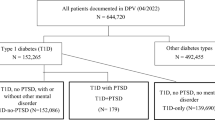Abstract
Prevalence of hyperglycemia-related posttraumatic stress (PTS) was assessed in 239 adults with type 1 diabetes using the posttraumatic stress diagnostic scale (PDS; Foa, Posttraumatic stress diagnostic scale manual, National Computer Systems, Inc., Minneapolis, 1995) by an anonymous online survey. Additionally, this study aimed to identify variables related to hyperglycemia-related PTS. Over 30 % of participants reported symptoms consistent with PTSD related to hyperglycemia with standard PDS scoring, and 10 % with more conservative scoring. Hierarchical multiple regression analyses indicated that diabetes self-management behavior and perceived helplessness about hyperglycemia predicted PTSD with standard scoring. Perceived death threat, self-management behavior, helplessness about hyperglycemia, and severity of hypoglycemia in past month predicted PTSD using more conservative scoring. Perceived helplessness, hypoglycemia severity, perceived death-threat, HbA1c, and self-management behavior predicted PTS severity. When fear, helplessness, and perceived death-threat were combined to represent an overall cognitive appraisal factor, this variable was the strongest predictor of PTSD and PTS severity. Scores for PTSD symptom clusters appeared similar to data on hypoglycemia-related PTS.

Similar content being viewed by others
References
Barakat, L. P., Kazak, A. E., Gallagher, P. R., Meeske, K., & Stuber, M. (2000). Posttraumatic stress symptoms and stressful life events predict the long-term adjustment of survivors of childhood cancer and their mothers. Journal of Clinical Psychology in Medical Settings, 7, 189–196.
Boyer, B. A. (2008a). Diabetes. In B. A. Boyer & M. I. Paharia (Eds.), Comprehensive handbook of clinical health psychology (pp. 179–200). Hoboken, NJ: Wiley.
Boyer, B. A. (2008b). Theoretical models in health psychology, and the model for integrating medicine and psychology. In B. A. Boyer & M. I. Paharia (Eds.), Comprehensive handbook of clinical health psychology (pp. 3–30). Hoboken, NJ: Wiley.
Boyer, B. A., & Deatrich, K. G. (2015). Peri-traumatic and post-traumatic stress among individuals with diabetes mellitus. In C. R. Martin, V. R. Preedy, & V. B. Patel (Eds.), Comprehensive guide to post-traumatic stress disorders (pp. 1–15). Basel: Springer International Publishing.
Boyer, B. A., & Matour, S. (2008, March). Predicting appraisals of cardiac surgery by pre-surgical trauma, posttraumatic stress, and depression. Poster presented at the 29th annual meeting of the Society of Behavioral Medicine, San Diego, CA.
Boyko, E. J., Jacobson, I. G., Smith, B., Ryan, M. A., Hooper, T. I., Amoroso, P. J., … Smith, T. C. (2010). Risk of diabetes in U.S. military service members in relation to combat deployment and mental health. Diabetes Care, 33, 1771–1777.
Centers for Disease Control and Prevention. (2011). National diabetes fact sheet: National estimates and general information on diabetes and prediabetes in the United States, 2011. Atlanta, GA.: U.S. Department of Health and Human Services, Center for Disease Control and Prevention.
Cohen, J. (1977). Statistical power analysis for the behavioral sciences. Hillsdale, NJ: Erlbaum.
Cox, D. J., Irvine, A., Gonder-Frederick, L. A., Nowacek, G., & Butterfield, J. (1987). Fear of hypoglycemia: Quantification, validation, and utilization. Diabetes Care, 10, 617–621.
Coyne, J. C., Palmer, S., & Cook, J. (2003). Trauma as metaphor for the cancer experience: Inaccurate and unhelpful. Annals of Behavioral Medicine, 25, S174.
Davis, C. L., Delamater, A. M., Shaw, K. H., La Greca, A. M., Eidson, M., Perez-Rodriguez, J., & Nemery, R. (2001). Brief report: Parenting styles, regimen adherence, and glycemic control in 4- to 10-year old children with diabetes. Journal of Pediatric Psychology, 26, 123–129.
Foa, E. B. (1995). Posttraumatic stress diagnostic scale manual. Minneapolis, MN: National Computer Systems, Inc.
Foa, E. B., Cashman, L., Jaycox, L., & Perry, K. (1997). The validation of a self-report measure of posttraumatic stress disorder: The posttraumatic diagnostic scale. Psychological Assessment, 9, 445–451.
Gold, A. E., MacLeod, K. M., Frier, B. M., & Deary, I. J. (1995). Changes in mood during acute hypoglycemia in healthy participants. Journal of Personality and Social Psychology, 68, 498–504.
Gonder-Frederick, L. A., Cox, D. J., & Bobbitt, S. A. (1986). Blood glucose symptom beliefs and diabetic patients: Accuracy and implications. Health Psychology, 5, 327–341.
Gonder-Frederick, L. A., Cox, D. J., Bobbitt, S., & Pennebaker, J. W. (1989). Mood changes associated with blood glucose fluctuations in insulin-dependent diabetes mellitus. Health Psychology, 8, 45–59.
Gonder-Frederick, L. A., Cox, D. J., & Clarke, W. L. (2002). Diabetes. In A. Christensen & M. Atoni (Eds.), Chronic physical disorders (pp. 137–164). Malden, MA: Blackwell.
Goodwin, R. D., & Davidson, J. R. (2005). Self-reported diabetes and posttraumatic stress disorder among adults in the community. Preventative Medicine, 40, 570–574.
Greco, P., La Greca, A., Ireland, S., Wick, P., Freeman, C., Agramonte, R., & Skyler, J. (1990). Assessing adherence in IDDM: A comparison of two methods. Diabetes, 40, A165.
Horsch, A., McManus, F., & Kennedy, P. (2012). Cognitive and non-cognitive factors associated with posttraumatic stress symptoms in mothers of children with type 1 diabetes. Behavioral and Cognitive Psychotherapy, 40, 400–411.
Horsch, A., McManus, F., Kennedy, P., & Edge, J. (2007). Anxiety, depressive, and posttraumatic stress symptoms in mothers of children with type 1 diabetes. Journal of Traumatic Stress, 20, 881–891.
Irvine, A. A., Cox, D., & Gonder-Frederick, L. (1992). Fear of hypoglycemia: Relationship to physical and psychological symptoms in patients with insulin-dependent diabetes mellitus. Health Psychology, 11, 135–138.
La Greca, A. M. (1992). Brief manual for the self care inventory. Miami, FL: Author.
La Greca, A. M., Swales, T., Klemp, S., & Madigan, S. (1988). Self care behaviors among adolescents with diabetes. In Proceedings of the ninth annual sessions of the Society of Behavioral Medicine, Boston, A42.
La Greca, A. M., Swales, T., Klemp, S., Madigan, S., & Skyler, J. S. (1995). Adolescents with diabetes: Gender differences in psychosocial functioning and glycemic control. Children’s Health Care, 24, 61–78.
Landolt, M. A., Ribi, K., Laimbacher, J., Vollrath, M., Gnehm, H. E., & Sennhauser, F. H. (2002). Brief Report: Posttraumatic stress disorder in parents of children with recently diagnosed type 1 diabetes. Journal of Pediatric Psychology, 27, 647–652.
Landolt, M. A., Vollrath, M., Laimbacher, J., Gnehm, H. E., & Sennhauser, F. H. (2005). Prospective study of posttraumatic stress disorder in parents of children with newly diagnosed type 1 diabetes. Journal of the American Academy of Child and Adolescent Psychiatry, 44, 682–689.
Livneh, H., & Martz, E. (2006). On structure of trauma-related stress reactions among people with diabetes mellitus. Psychological Reports, 99, 209–212.
Lustman, P., & Clouse, R. (2002). Treatment of depression in diabetes: Impact on mood and medical outcome. Journal of Psychosomatic Research, 53, 917–924.
Manne, S. L., Du Hamel, K., Gallelli, K., Sorgen, K., & Redd, W. H. (1998). Posttraumatic stress disorder among mothers of pediatric cancer survivors: Diagnosis, comorbidity, and utility of the PTSD checklist as a screening instrument. Journal of Pediatric Psychology, 23, 357–366.
McNally, R. J. (2005). Progress and controversy in the study of posttraumatic stress disorder. Annual Reviews in Psychology, 54, 229–253.
Musch, J., & Reips, U. (2000). A brief history of Web experimenting. In M. H. Birnbaum (Ed.), Psychological experiments on the Internet (pp. 61–87). San Diego, CA: Academic Press.
Myers, V. H., Boyer, B. A., Herbert, J. D., Barakat, L. P., & Scheiner, G. (2007). Fear of hypoglycemia and self reported posttraumatic stress in adults with type 1 diabetes treated by intensive regimens. Journal of Clinical Psychology in Medical Settings, 14, 11–21.
Nosek, B. A., Banaji, M. R., & Greenwald, A. G. (2002). E-Research: Ethics, security, design, and control in psychological research on the Internet. Journal of Social Issues, 58, 161.
Nunnally, J., & Bernstein, L. (1994). Psychometric theory. New York: McGraw-Hill Higher, Inc.
Pedersen, S. S. (2001). Post-traumatic stress disorder in patients with coronary artery disease: A review and evaluation of the risk. Scandinavian Journal of Psychology, 42, 445–451.
Polonsky, W. H., Davis, C. L., Jacobson, A. M., & Anderson, B. J. (1992). Correlates of hypoglycemic fear in Type I and Type II diabetes mellitus. Health Psychology, 11, 199–202.
Reips, U., & Musch, J. (2002). Special issue: Internet-based psychological experimenting. Experimental Psychology, 49, 241–242.
Sacks, D. B. (1999). Carbohydrates. In C. Burtis & E. Ashwood (Eds.), Tietz textbook of clinical chemistry (3rd ed., pp. 750–808). Philadelphia, PA: WB Saunders.
Sacks, D. B., Bruns, D. E., Goldstein, D. E., MacLaren, N. K., McDonald, J. M., & Parrott, M. (2002). Guidelines and recommendations for laboratory analysis in the diagnosis and management of diabetes mellitus. Clinical Chemistry, 48, 436–472.
Smith, M. Y., Redd, W. H., Peyser, C., & Vogl, D. (1999). Post-traumatic stress disorder in cancer: A review. Psycho-Oncology, 8, 521–537.
Spindler, H., & Pedersen, S. S. (2005). Posttraumatic stress disorder in the wake of heart disease: Prevalence, risk factors, and future research directions. Psychosomatic Medicine, 67, 715–723.
Stoppelbein, L., & Greening, L. (2007). Brief report: The risk of posttraumatic stress disorder in mothers of children diagnosed with pediatric cancer and Type I diabetes. Journal of Pediatric Psychology, 32, 223–229.
Strauss, G. J. (1996). Psychological factors in intensive management of insulin-dependent diabetes mellitus. Nursing Clinics of North America, 31, 737–745.
Streiner, D. (2003). Starting at the beginning: An introduction to coefficient alpha and internal consistency. Journal of Personality Assessment, 80, 99–103.
Surwit, R. S., Feinglos, M. N., & Scovern, A. W. (1983). Diabetes and behavior: A paradigm for health psychology. American Psychologist, 38, 255–262.
Taylor, L. A., & Rachman, S. J. (1988). The effects of blood sugar level changes on cognitive function, affective state, and somatic symptoms. Journal of Behavioral Medicine, 11, 279–291.
Wiebe, D. J., Alderfer, M. A., Palmer, S. C., Lindsay, R., & Jarrett, L. (1994). Behavioral self-regulation in adolescents with type 1 diabetes: Negative affectivity and blood glucose symptom perception. Journal of Consulting and Clinical Psychology, 62, 1204–1212.
Wikman, A., Bhattacharyya, M., Perkins-Porras, L., & Steptoe, A. (2008). Persistence of posttraumatic stress symptoms 12 and 36 months after acute coronary syndrome. Psychosomatic Medicine, 70, 764–772.
Wysocki, T., Taylor, A., Hough, B. S., Linscheid, T. R., Yeates, K. O., & Naglieri, J. A. (1996). Deviation from developmentally appropriate self-care autonomy: Association with diabetes outcomes. Diabetes Care, 19, 119–125.
Acknowledgments
Authors wish to thank the participants who provided this information about their experience. Some of this data was previously presented at the 33rd Annual Conference of the Society of Behavioral Medicine, New Orleans, LA in 2012.
Author information
Authors and Affiliations
Corresponding author
Ethics declarations
Conflict of Interest
Chelsea P. Renna, Bret A. Boyer, Maurice F. Prout, and Gary Scheiner declare they have no conflict of interest.
Human and Animal Rights and Informed Consent
All procedures followed were in accordance with the ethical standards of the responsible committee on human experimentation (institutional and national) and with the Helsinki Declaration of 1975, as revised in 2000. Informed consent was obtained from all patients for being included in the study.
Rights and permissions
About this article
Cite this article
Renna, C.P., Boyer, B.A., Prout, M.F. et al. Posttraumatic Stress Related to Hyperglycemia: Prevalence in Adults with Type I Diabetes. J Clin Psychol Med Settings 23, 269–284 (2016). https://doi.org/10.1007/s10880-016-9463-x
Published:
Issue Date:
DOI: https://doi.org/10.1007/s10880-016-9463-x




